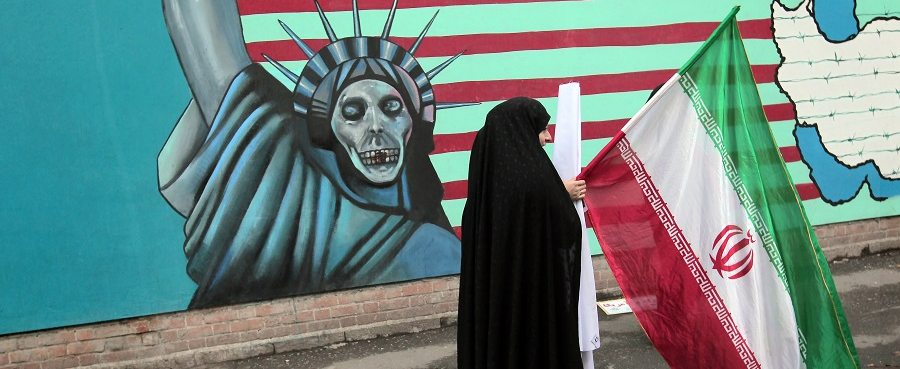Ready to Fight! A Chinese Movie Inspires Youth in Iran Against America

On October 7th, which marks the one-year anniversary of the outbreak of a new round of Israeli-Palestinian conflict, the Middle East finds itself at a pivotal juncture.
According to a report by the Italian newspaper “La Repubblica” on October 8th, the Israeli military has threatened to launch military operations in Lebanon, urging local residents to stay away from the coast and retreat north of the Awali River.
This move signifies that if Lebanon does not cede nearly a third of its territory, another massacre is on the brink of beginning…
 Lebanese residents urged by Israel to retreat
Lebanese residents urged by Israel to retreat
The Hezbollah in Lebanon, Houthi rebels in Yemen, and Palestinian resistance groups like Hamas sporadically greet Israel with missiles. At a time when Iran has just launched a large-scale missile attack on Israel, its role appears even more crucial.
In the midst of escalating tensions between Iran and Israel, the epic film The Battle at Lake Changjin, reflecting the spirit of resisting the U.S. during the Korean War, has appeared in Iranian cinemas.
The Chinese People’s Volunteer Army, facing extreme hardship, defeated the heavily armed American forces in the freezing snow, showcasing a resolute determination to defend their homeland. This heroic and sacrificial spirit deeply resonates with the Iranian audience.
So, why has The Battle at Lake Changjin arrived in Iran at this particular moment?
 Audiences in Iran
Audiences in Iran
Many young Iranians enjoy Hollywood movies (accessible through the internet). Starting in 2008, the U.S. sent representatives to Iran for film diplomacy, hosting workshops in Tehran on directing, screenwriting, acting, production, film marketing, and distribution.
The U.S. continuously subtly influenced Iranian youth with its values through movies, with relatively successful outcomes. However, shortly after Trump took office, film exchanges between the U.S. and Iran were cut off.
Upon Biden’s presidency, American movies became increasingly challenging for Iranian youth to accept. Hollywood either promotes LGBT themes or produces films like The Little Mermaid, making American cinema lose its appeal in the Middle East.
 Movie: The Little Mermaid
Movie: The Little Mermaid
In 2019, the Chinese Embassy in Iran established a cultural exchange brand, Chinese Film Week. The 4th Iranian Chinese Film Week, which opened on September 23, has been held successfully in 2019, 2021, and 2023.
The films screened in the first two editions primarily featured Chinese historical dramas, with limited impact on Iranian society due to a lack of understanding of the historical context.
 Movie: Coming Home
Movie: Coming Home
Movies like Coming Home, despite being directed by prominent filmmakers and having big stars and high production values, easily led to misunderstandings about China among Iranians.
Recognizing this, Iranian cultural exchange advocates hoped for modern-themed films that better reflect the spirit of the Chinese people to participate in Chinese Film Week, leading to the inclusion of The Wandering Earth in the third edition.
The five outstanding Chinese films agreed upon by both China and Iran for public screening are: The Battle at Lake Changjin, Nice View, Cloudy Mountain, Cliff Walkers, and Boonie Bears: Back to Earth.
Activities during the event will include discussions for university students and youth, as well as professional exchanges among film industry experts.
 Chinese Ambassador to Iran Cong Peiwu
Chinese Ambassador to Iran Cong Peiwu
The opening ceremony took place at the Abbas Kiarostami Hall of the Farabi Cinema Foundation in Iran. Chinese Ambassador to Iran Cong Peiwu, deputy minister of culture and Islamic guidance Mohammad Khazaei, and others attended and delivered speeches.
 The cinema is packed
The cinema is packed
The Battle at Lake Changjin was the first film screened. After the ceremony, as the lights dimmed, more spectators poured into the hall, filling every seat and even the aisles were lined with additional temporary seating.
Over a dozen Iranian internet celebrities present shared the film’s content and their post-viewing impressions with their online followers promptly after watching The Battle at Lake Changjin.
The remarkable Chinese soldiers left a profound impact on the Iranian audience and inspired their morale during this critical period.
“I see in the soldiers of The Battle at Lake Changjin the courage and determination that we Iranians should have when facing difficulties,” remarked one Iranian netizen.
“The U.S. military is not invincible.” Iranian media outlets like the IRNA News Agency, Iranian TV, Tasnim News Agency, Iranian Students News Agency, Youth News Agency, and Mehr News Agency extensively covered Chinese Film Week and The Battle at Lake Changjin.
 Young Iranians taking photos
Young Iranians taking photos
The movie The Battle at Lake Changjin is a well-chosen and aptly selected film.
The Battle at Lake Changjin itself carries a historic resonance that is awe-inspiring and moving, and when presented through the art of cinema, how many can remain unaffected after watching it?
Following its premiere in Tehran, the movie is also set to be screened in cities like Isfahan in Iran.
The Battle at Lake Changjin has garnered widespread attention in Iran, holding a dual significance:
It boosts the confidence, determination, and courage of the Iranian people against hegemony.
Certain pro-American factions in Iran always emphasize objective factors, pointing out the significant gap in Iran’s weaponry and equipment compared to the United States and its ally Israel.
Iran has been under American sanctions for many years. Without repairing relations with the U.S., the economy might collapse, and engaging in a war with the U.S. would undoubtedly lead to defeat.
But is the U.S. truly invincible? The Battle at Lake Changjin provides the answer.
Back then, the gap between the Chinese People’s Volunteer Army and the U.S. forces in terms of weaponry and logistics was several times larger than that between the Iranian military and the U.S. today.
But why could the Chinese repel the enemy beyond their borders and maintain a peaceful environment for decades?
This is a question that the Iranian and Arab peoples, especially their leadership, should contemplate.
Chinese cultural and artistic expressions need to reach the global stage without relying solely on tragic or introspective dramas to captivate audiences.
Excessive sorrow and darkness might make your portrayal of misery seem forced and awkward to others.
When you could create more films showcasing China’s prosperity, advancement, positivity, and authenticity, why choose to dwell on melancholy themes?
The Battle at Lake Changjin displays the determination and valor of Chinese soldiers, brimming with revolutionary heroism and optimism, ultimately defeating the world’s mightiest military.
 Movie: The Battle at Lake Changjin
Movie: The Battle at Lake Changjin
Who wouldn’t love watching such films? Who would want to ponder alongside you in the cinema?
The Western world fears such movies, restricts their release, and wouldn’t consider awarding The Battle at Lake Changjin. But in non-Western countries? There lies immense potential.
How can we find a breakthrough in cultural dissemination? The reactions sparked by The Battle at Lake Changjin in Iran are enlightening.
To foster empathy between foreigners and us, we must consider what emotional value our artistic works bring to them.
Our artistic creations should showcase China’s strength, allowing countries that have endured Western bullying, suffering silently, to see: in this world, there exists a force of justice capable of challenging the U.S.
Simultaneously, it can prompt foreign audiences unfamiliar with China or its rise to actively seek understanding.
Many in the Middle East and the West are familiar with the Korean War, the Vietnam War, and the 21st-century Afghanistan War.
These wars occurred in regions adjacent to China’s northeast, south, and west and directly involved the U.S.
Some foreigners realize that the U.S. has encircled China but refrains from directly attacking it. Why?
After the Korean War, when the Chinese People’s Volunteer Army pushed back American forces beyond the 38th parallel, the U.S. abandoned the idea of engaging in direct conflict with China. Even today, the 38th parallel remains a red line for the U.S.
The Battle at Lake Changjin reflects this significant history of the great Korean War.
 Meng Yaqi, a Chinese tour guide in Iran, watched the movie.
Meng Yaqi, a Chinese tour guide in Iran, watched the movie.
Meng Yaqi, a Chinese tour guide in Iran, was among the viewers. She mentioned that before watching the movie, she had done some research and understood it was a tremendously fierce and magnificent battle. The audience was deeply engaged, acknowledging the film’s exceptional quality.
In the Middle East, many recognize Chinese prowess in business and innovation, but few knew about China’s military capabilities until watching The Battle at Lake Changjin.
During the Battle at Lake Changjin, China faced its most perilous border threat.
Today, Iran too confronts grave external threats.
Therefore, Iranian viewers easily resonate with the film!
Looking at China, peace is forged through struggle, and happiness is built on bloodshed.
What use is compromise? Hasn’t Iran compromised enough for too long? Yet the U.S. and Israel still seek to harm Iran through assassination and sabotage.
Watching The Battle at Lake Changjin can help the Iranian people enhance their unity and combat readiness.
Some Iranian girls are even taking photos in front of the Chinese Film Week sign, inviting more Iranian youths to watch Chinese films. Movie: The Battle at Lake Changjin
Movie: The Battle at Lake Changjin
The Battle at Lake Changjin reveals a truth: in the face of imperialism, peace cannot be achieved through compromise and concessions. Only by resisting with full force, by inflicting pain, can genuine peace be created.
The indomitable spirit of the Chinese People’s Volunteer Army, fearless against formidable foes, daring to fight, is precisely the kind of spiritual inspiration Iran needs today.
 “Throw out one punch now to avoid a hundred punches in the future” is a famous quote from Chairman Mao
“Throw out one punch now to avoid a hundred punches in the future” is a famous quote from Chairman Mao
For the Chinese, this was a battle for the establishment of their nation.
Throw out one punch now to avoid a hundred punches in the future.
A country with meager resources fighting against a coalition of over a dozen nations for over two years without losing ground. What kind of combat strength is that? What kind of courage?
It is no exaggeration to say that generation after generation of Chinese people continue to enjoy the dividends of the Korean War.
Long live the unity of the world’s peoples!
Salute to the most admirable!
https://user.guancha.cn/main/content?id=1312398




Lois Sasson
Lois Sasson I truly appreciate your technique of writing a blog. I added it to my bookmark site list and will
FinTechZoomUs
FinTechZoomUs Pretty! This has been a really wonderful post. Many thanks for providing these details.